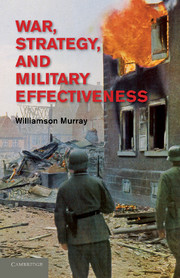Book contents
- Frontmatter
- Contents
- Introduction
- 1 History and the Future
- 2 Thucydides and Clausewitz
- 3 Clausewitz out, Computers in: Military Culture and Technological Hubris
- 4 Changing the Principles of War?
- 5 Military Culture Does Matter
- 6 History and Strategic Planning
- 7 Thoughts on Red Teaming
- 8 The Distant Framework of War
- 9 The Problem of German Military Effectiveness, 1900–1945
- 10 Reflections on the Combined Bomber Offensive
- 11 The Air War in the Gulf
- 12 Thoughts on British Intelligence in World War II and the Implications for Intelligence in the Twenty-First Century
- 13 The Meaning of World War II
- Index
- References
1 - History and the Future
Published online by Cambridge University Press: 07 October 2011
- Frontmatter
- Contents
- Introduction
- 1 History and the Future
- 2 Thucydides and Clausewitz
- 3 Clausewitz out, Computers in: Military Culture and Technological Hubris
- 4 Changing the Principles of War?
- 5 Military Culture Does Matter
- 6 History and Strategic Planning
- 7 Thoughts on Red Teaming
- 8 The Distant Framework of War
- 9 The Problem of German Military Effectiveness, 1900–1945
- 10 Reflections on the Combined Bomber Offensive
- 11 The Air War in the Gulf
- 12 Thoughts on British Intelligence in World War II and the Implications for Intelligence in the Twenty-First Century
- 13 The Meaning of World War II
- Index
- References
Summary
The early Greek imagination envisaged the past and the present as in front of us – we can see them. The future invisible, is behind us.…Paradoxical as it may sound to the modern ear, this image of our journey through time may be truer to reality than the medieval and modern feeling that we face the future as we make our way forward into it.
The study of history provides no clear, certain path for understanding the future. At best, its lessons are uncertain and ambiguous. No matter how sophisticated and eloquent historians may be, they can only present rough approximations of the past, much less the present or the future, both of which invariably consist of surprises as well as unanticipated changes and challenges. Yet, history, writ large, represents the best laboratory mankind possesses for understanding the future. There are, of course, other disciplines for thinking about the future, particularly when they address issues that have to do with human nature, such as anthropology, psychology, and literature. But almost invariably, these disciplines best address the future, when history provides a context for their use. Intelligent gaming can also approximate the future with some accuracy, such as the SIGMA games of 1965, which underlined that graduated escalation would not work against the North Vietnamese. Yet, the insights gained from those games also largely rested on the historical experiences of the French in their losing war against the Viet-Minh between 1946 and 1954. This reliance on historical context in almost all predictive endeavors of utility occurs because only historically based disciplines provide the path to Sun Tsu's admonition that above all else “one must understand one's enemy,” as well as oneself.
- Type
- Chapter
- Information
- War, Strategy, and Military Effectiveness , pp. 14 - 44Publisher: Cambridge University PressPrint publication year: 2011



